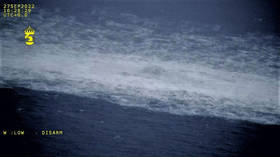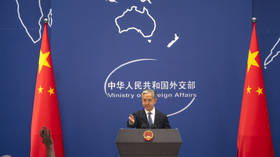Prosecutor predicts timeline for Nord Stream sabotage investigation

Sweden hopes to conclude its investigation into the Nord Stream gas pipeline sabotage by autumn of this year, prosecutor Mats Ljungqvist told Swedish radio on Wednesday. The underwater conduits were destroyed in a series of explosions in September of 2022.
Speaking to public service broadcaster SR, Ljungqvist stated that his team had met with the German prosecutor investigating the case and that the two countries were working together. He did not, however, provide any further details into the investigation, aside from setting an expected timeline.
"I hope that we at least this autumn will be able to make a decision regarding indictments, at least that is the ambition as things stand now," Ljungqvist said. "I think, actually, in time, [who did] it will be brought to light," he added.
Back in April, Ljungqvist released a statement in which he said that there was “no doubt” that the attack on Nord Stream constituted “gross sabotage in international waters,” adding that the primary focus of the investigation was to determine if Swedish interests or national security had been threatened.
In a statement to Reuters that same month, the prosecutor explained that the “absolute main scenario” being investigated by his team was that a state actor had been “directly or at least indirectly” responsible for the attack.
In his interview with SR, Ljungqvist stated this hypothesis “has been strengthened during the course of the investigation.”
No country has yet claimed responsibility for the attack on the Nord Stream 1 and Nord Stream 2 natural gas pipelines that linked Russia and Germany across the Baltic Sea. Sweden, Germany, and Denmark have conducted probes into the attack since last fall. However, all three have been reluctant to open up about their findings, and have rejected offers from Russia to assist with the probe.
Meanwhile, American journalist Seymour Hersh has accused the US of ordering and carrying out the sabotage with the help of the Norwegian Navy under the cover of the BALTOPS military drills. His claims have been supported by Moscow, with Russian President Vladimir Putin pointing out that the US in particular had a motive for the attack due to its position as a competing gas supplier to Europe.
Washington and its allies have denied the allegations and have tried to blame Moscow for destroying its own infrastructure and have also speculated that “pro-Ukrainian groups” operating out of Poland might have conducted the operation, with or without Kiev’s official blessing.













